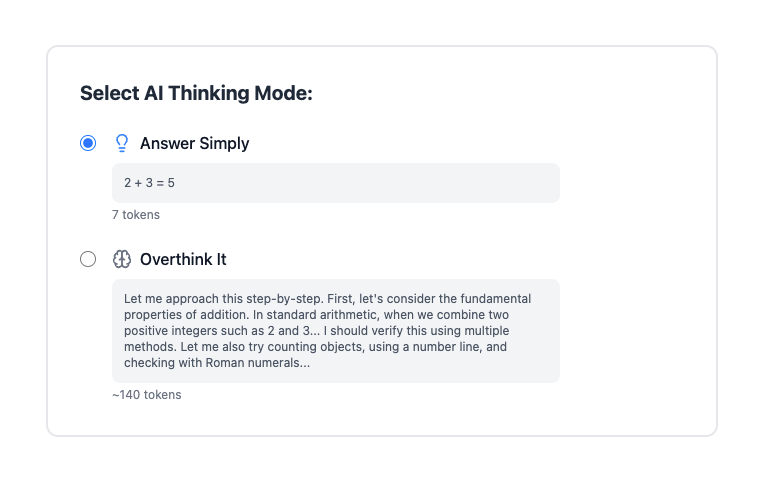Your AI Might Be Overthinking: A Guide to Better Prompting

Recent research suggests that modern AI language models, particularly reasoning-focused LLMs like o1, often engage in excessive computation. Here's what this means for prompt engineering and how you can optimize your AI interactions.
The Overthinking Problem
Consider this striking example: when asked to solve a simple "2+3" problem, these new AI models use 2000% more computational tokens than necessary. More concerning still, this verbosity doesn't necessarily translate to better results.
The research highlights several key patterns:
- First solutions are typically best - 92% of correct answers emerge in the initial attempt
- Additional reasoning often proves redundant
- Simple problems paradoxically trigger more verbose responses
- More computational tokens don't consistently yield better outcomes
Practical Implications for Prompt Engineering
Match Your Prompt to Problem Complexity
Your prompting strategy should align with task difficulty. Not every question needs an extensive reasoning chain. For simple queries, encourage direct responses; save detailed analysis for complex problems.
Define Clear Reasoning Structure
Be explicit in your prompts about:
- How many solutions you want
- What depth of analysis is appropriate
- What format the response should take
Set Clear Boundaries
Effective prompts often include:
- Expected response length
- Desired detail level
- Clear stopping conditions
- Format specifications
Use a Mixed Approach
Complex tasks can benefit from breaking the problem into components. Consider using:
- Short reasoning for straightforward subtasks
- Detailed analysis for complex elements
- Clear transition points between different reasoning depths
The Bottom Line
The most effective prompts aren't those that encourage exhaustive thinking, but rather those that guide the model toward efficient, purposeful reasoning. By understanding when to encourage deeper thought and when to seek directness, you can optimize your AI interactions for both accuracy and efficiency.
Remember: in the world of AI prompting, more isn't always better. Strategic, targeted prompting often yields superior results compared to encouraging extensive computation for every task.



